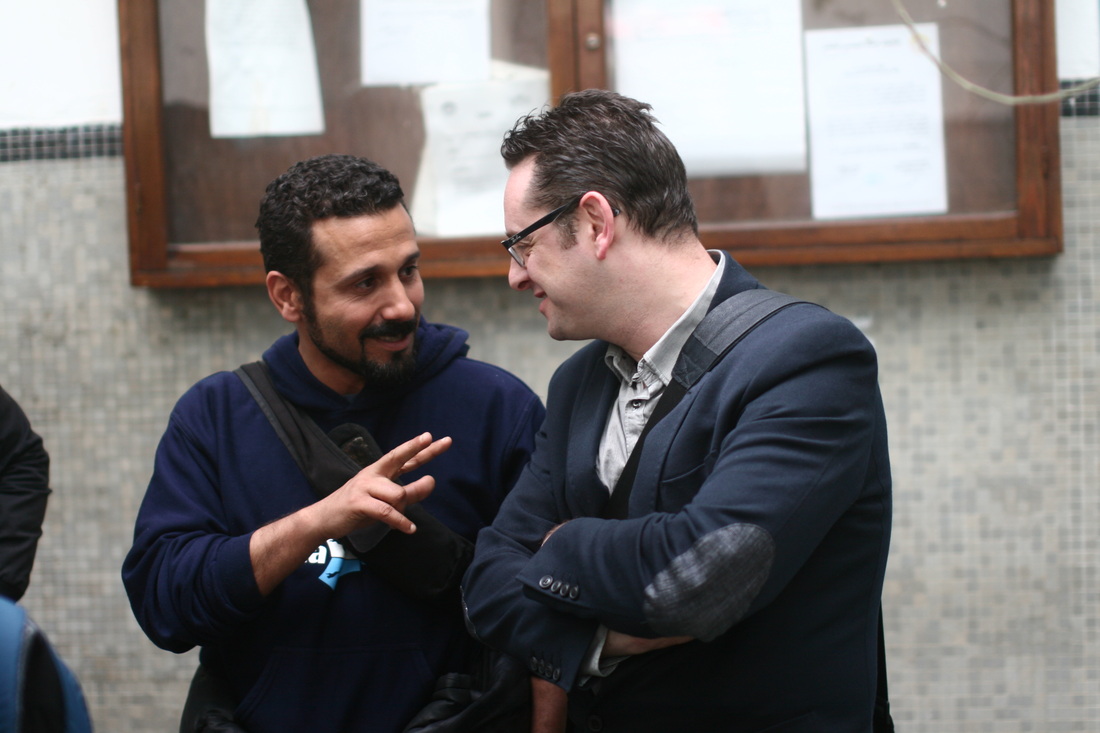|
The biggest achievement of the Tunisian revolution is the way they were able to consolidate the freedom of speech. There are various values who are in conflict, but this creates a type of stability according to Sami Zemni. We see the conflict between transition and cleavage with the old regime. Also the conflict between Secularism and Islam and most of all between labor and capital.
In Tunisia the difference between the capital, tunis, and the interior is very deep. The UGTT is the stronghold of Tunisia and can switch the country of when it wants. While Ennahda (Islamic conservatives) is the biggest party the biggest boat with a Tunisian flag has the name of a pagan goddess. And Tunisia is composed of so many different cultures. The slogan of the first president of the republic was, Bourguiba: “was open for the world, rooted in tradition”. This is all the legacy of Bourguiba, witch Ben Ali continued in one way or another. Now in Tunisia there are is the question what to do with this legacy. Create a society Bourguiba 2.0 and like wise continue the 'Tunésiété'. But this is what the ruling Ennahda party doesn't want, also the Salafists and organizations who want to go back to the root of Islam. Tunisia has become a country who is orientated more towards the Anglo-Saxon world. And the Ennahda behaves like the conservatives in the USA and the left wing parties like the democrats. And that's where the salafists come in, they are against this conservative Anglo-Saxon Ennahda and want a Muslim state. The traditional elite who was in power during French rule was suppressed by Bourguiba, they were chosen by the Islamic belief. Bourguiba introduced a meritocracy in the light of his modernist model. Like wise a new elite surged to power in Tunisia. Ben Ali chose a lot of capable people out of this elite. One thing we can say is that the Ben Ali used the best of the best for his government, so the administration is equipped with high educated elite. The problem is that there is a cleavage between the newly elected cabinets by Ennahda, who are not so highly qualified as the administration. This will provoke new conflicts in the public sector while one again a new Tunisian religious elite is bound to appear in the Tunisian scene. (source: Animo international meeting with Sami Zemni. )
0 Comments
On the 10th of April, the Spinelli group of the the EU parliament organized a #SpinelliDebate in the Parliament. Central question was if the Arab Spring has failed? The EU was taken by surprise when the Arab world awoke, as demonstrated by the uncoordinated national responses rather than a European response. This situation highlights the need for a better structured and more focused EU policy approach in order to participate to the emergence of a more stable and democratic Arab world. Today the Arab world’s new political elites are facing the double challenge of satisfying popular pressure for democratic governance and an economic and social crisis. Have the Arab Spring protests calling for democracy and economic justice, just come and gone?
The mainspeakers in the Parliament were Néguib Chebbi, Leader of the Democratic Progressive Party (Tunisia), Mahmud Gebril, Interim prime minister of Libya during the civil war and former chairman of the National Transition Council. Guy Verhofstadt, Spinelli MEP, President of the ALDE Group, Isabelle Durant, Spinelli MEP, Vice-President of the European Parliament. 'For the new governments in power in the NA (North Africa) it takes a long time to build the institutions. First they have to build confidence and legitimacy.' According to Isabelle Durant. Gebril says that those who read history know we are in the introductory fase. We should build on the strategic partnership between the EU and the NA. Because the stability of NA en the EU are at stake here. We can say that the Libyan Revolution started at in the EP (European Parliament). Everything was so hasty, a revolution like this is unknown in the region. We can say that a new generation stood up with new value systems. This new culture will bring about the change we need, it will determine the regimes. But the revolution caused a vacuum, because there wasn't an alternative, people were looking for freedom in the streets. Now for my country I (Gebril) can say the we live in a stateless society, we need to be open for national dialogue and search for consensus. We are sure that the “.com” generation will reject all old ideologies. Chebbi: 'Our economical system has failed, the highest educated young people are the most underemployed. We recognize that 60 tot 70% of the people of NA are young people. It's normal that the fire that started in Tunisia has propagated around the MENA. Even the opposition in Tunisia was caught by surprise, there was no alternative, only a big vacuum. It was important to safe the state and to change the political regime. Now we have to reorganize our economical and political system. It was a revolution for reforms. Tunisia is in the mist, I (Chebbi) don't think the revolution has failed. Gebril: 'It is important to integrate the Arab youth into the political process, the Arab Spring will fail if we don't give them a future.' |
Archives
January 2015
Categories
All
|


 RSS Feed
RSS Feed
